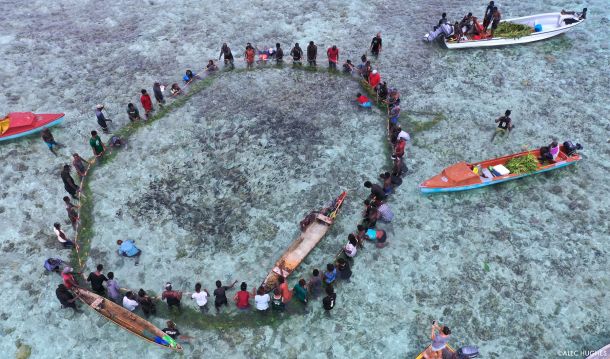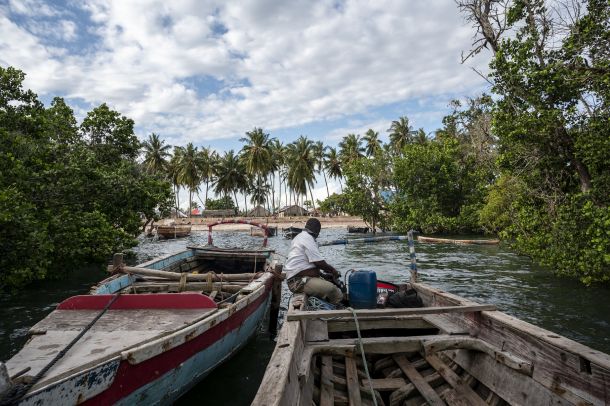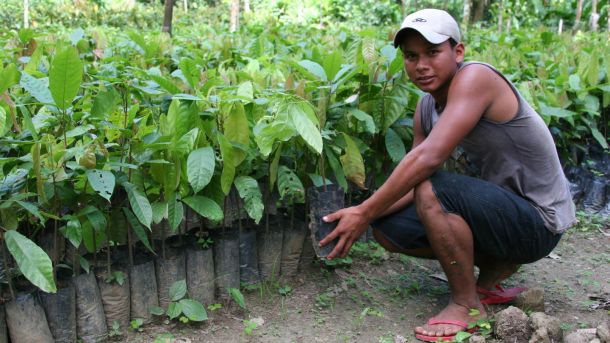
A traditional fish drive in the Solomon Islands. Photo credit: ©Alec Hughes.
The long-awaited biennial Conference of the Parties—or COP—to the U.N. Convention on Biological Diversity got underway last week in Montreal after a two-year delay caused by the covid pandemic.
The convention is working toward a Global Biodiversity Framework (GBF) to serve as the underlying goals and targets to achieve the objectives of the convention in the current decade (or “post-2020” as participants like to say), and beyond. Most COP attendees are working towards the development and adoption of an ambitious and robust post-2020 GBF to be agreed upon at the close of the meeting.
The most widely discussed target of the meeting in the lead-up to the COP has been the commitment to protect and conserve at least 30 percent of terrestrial and marine areas by 2030—what has become informally referred to as “30 by 30,” but to achieve that target so many others must also be addressed.
Those include draft Targets 1, on spatial planning; 5, on trade and use of wild species; 15, on businesses and human rights; 20, on traditional knowledge; 21, on full and effective participation and access to justice; and Target 22, on gender equality and women’s rights to name a few. I am focused on the inclusion of strong commitments to address the human rights and self-determination of Indigenous Peoples and Local Communities (IP and LCs) across the globe.
IP and LCs have suffered the greatest consequences of our global biodiversity and climate crises despite some of these groups being active champions in fighting these crises. Therefore, we need a transformative collective approach in how we protect and restore nature. Parties to the CBD must join with Indigenous Peoples and Local Communities in a common vision in order for us to collectively address the threats we face.
That’s why I’m pleased to note that human rights are being placed at the center of this biodiversity COP, with IP and LCs at the table to influence the framework, strongly grounded in the UN Declaration on the Rights of Indigenous Peoples (UNDRIP) and other international human rights core treaties, as well as the ILO Convention 169 on Indigenous and Tribal Peoples that covers many people of African descent, traditional forest, and coastal local communities.
Whether we’re talking about species conservation, carbon storage, or sustainable use of natural resources, Indigenous Peoples have an extraordinary record of conservation and their territories frequently are better managed than other forms of conservation designation.

Whether we’re talking about species conservation, carbon storage, or sustainable use of natural resources, Indigenous Peoples have an extraordinary record of conservation. Photo credit: © Alissa Everett.
It is essential to center Indigenous Peoples and Local Communities’ rights in the final text of COP15. Likewise, the full, equitable, inclusive, effective, and gender-responsive representation and participation in the decision-making of Indigenous Peoples and Local Communities is essential to implement and monitor the progress of the GBF goals.
In meetings this week, more needs to be done to promote and secure a human rights-based approach in the GBF, build bridges between different stakeholders, and ensure that such an approach is reflected during implementation in different geographies and contexts around the world. Funds should be channeled to IP and LCs directly, or through trusted organizations that have accompanied communities over the long term, built on principles of equity and effective participation in decision-making.
Where funding is passed through or managed by governments or other organizations, it is important to ensure that it is spent in ways that implement UNDRIP and international human rights treaties.
Through a human rights-based approach that engenders inclusion, equity, and justice, WCS will continue supporting IP or LC-led conservation, and can also support the meaningful and effective expansion of the role of IP and LCs, should they choose, in the management of existing protected areas, other conserved areas, and surrounding landscapes that are not governed or managed by them in some countries.
WCS has been engaged in efforts globally across various governance models that can lend support to informing and implementing a Global Biodiversity Framework that will be agreed to by the parties to the CBD convention in Montreal this month.

WCS has been working with the Tacana Indigenous People in Bolivia for more than two decades. Photo credit: ©Eleanor Briggs.
For example, in Fiji, the Solomon Islands, and Papua New Guinea, WCS has facilitated the development of community-based management within locally-managed marine areas with over 100 Indigenous communities. In Bolivia alone, we have helped secure land title to 1.5 million hectares of Indigenous lands and in Colombia, we have supported an Afro-Descendant-led initiative by the Naya River Council to establish a 26,400-hectare Marine Protected Area on their lands in Isla Ají. Cambodia’s Keo Seima Wildlife Sanctuary, with WCS support, has more Indigenous Peoples collective land titles awarded within it than any other protected area in the country.
The biodiversity crisis is inseparable from the destruction of ecological integrity—in particular by commercial extractive industries that do not respect the free, prior, and informed consent of IPs and LCs, by transportation infrastructure that is not sensitive to people’s views, and by unsustainable agriculture and agricultural practices (particularly large-scale agribusiness).
When we degrade high-integrity places of nature, we not only destroy habitat and the interdependence of species in a healthy ecosystem. We also degrade those areas’ capacity to trap and store carbon. We bring people, wildlife, and livestock populations into greater contact with the potential for spillover of deadly pathogens that threaten another pandemic.
These are the existential challenges of our time. As CBD Parties debate and finalize a post-2020 Global Biodiversity Framework, we must acknowledge and embrace the outsized role Indigenous Peoples and local communities play, and have always played, in sustaining our planet. We need to respect and co-create spaces for and with them to lead on solutions, but also make sure that we do not burden them with solving a problem created by larger interests. Indeed, our collective survival depends on it.
